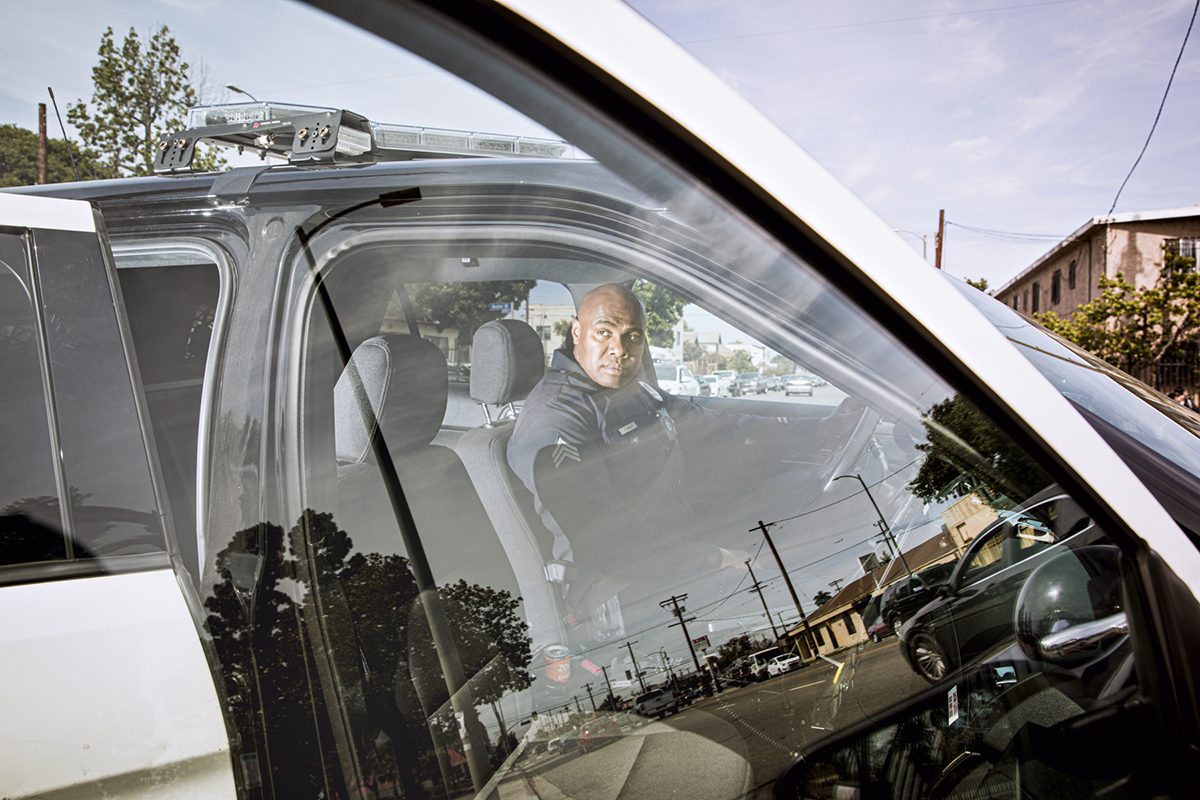Read the full story at TCU Magazine
Growing up in South Gate, California, a stone’s throw from Los Angeles’ notorious South Central neighborhoods, Saipele “Sai” Tuialii ’18 MS knew at 15 he wanted to be a police officer.
A ride-along with his police officer uncle inspired Sai Tuialii to pursue a career
fighting crime and helping people. Photo by Christina Gandolfo
“My uncle was a police officer, and I got to do a ride-along in his patrol car one
night,” Tuialii said. “I remember this like it was yesterday: It was a Saturday night,
and it was raining hard, so my uncle said it would probably be a slow night.”
As the ride-along began, his uncle received an urgent call. Siren screaming, they raced to a home and found a man waving for help.
“He was in his front yard calling us, like, ‘Hey, over here! Over here!’ And now I’m starting to get a little scared,” Tuialii said.
They followed the man to the back door, where they found a woman in labor. Despite the initial shock, Tuialii made himself useful by grabbing clean towels. Then he stood back and watched his uncle deliver the baby.
“From that night,” Tuialii said, “I knew this is what I wanted to do. … I saw how you can make a difference in your area, in the lives of your neighbors.”
Tuialii’s parents immigrated to the U.S. from Samoa at separate times. They met in
Los Angeles before settling in South Gate, where about 95 percent of residents are
Latino. His skin, Tuialii said, is darker than the average Samoan’s. In high school
basketball, the 6-foot-5-inch starting forward identified with Latino and African
American teammates equally.
“But I have always kept my culture,” he said. “There were only two Samoan families in our area: my family and my aunt and uncle living two blocks away. My parents made us speak Samoan in the house. We ate a lot of Samoan food with family, with my cousins, and we cooked in an umu — a traditional cooking pit — my dad and my uncles dug out in our backyard.”
Police Sgt. Sai Tuialli is fighting crime on the streets of South Los Angeles. He
grew up in the area, leaving to play basketball at TCU. Photo by Christina Gandolfo
Tuialii saw plenty of illicit activity in South Gate, separated from South Central
by only a train track along Alameda Boulevard. While his uncle donned a police uniform
for nearby Huntington Park, Tuialii knew others in his family were “running the streets,”
involved with gangs. He credits his parents’ influence and year-round athletics for
keeping him out of trouble.
Leaving his hometown, where he felt a deep sense of belonging, was never Tuialii’s intention. His vague plan was to graduate from high school and get a job. A recruiting letter from Santa Clara University came as a shock.
“I didn’t know anything at all about college basketball,” he said. “But my coach explained that I could go to college for free.”
Santa Clara University coaches said that the prospect would need to take something called the SAT — a test Tuialii was unfamiliar with.
“I was not prepared,” he said. “When I opened that test booklet, I saw vocabulary words and math I’d never seen in my life.”
Without sufficient test scores, Tuialii lost the scholarship opportunity. Instead,
he played basketball at Los Angeles City College from 1993 to 1995. He proved himself
in the classroom and on the court, attracting offers from Clemson University, Arizona
State University, TCU and the University of Southern California, a mere 20 minutes
from his home.
“Being a LA boy, I would’ve played for USC,” Tuialii said. “But the day before I signed my letter of intent, the entire USC coaching staff was let go.”
Tuialii had already visited Fort Worth and forged a relationship with then-head coach Billy Tubbs, so he was happy to sign with TCU the following day.
“I was in charge of on-campus recruiting, so I got to spend a lot of time with Sai when he visited,” said Steve Smith, who served as assistant basketball coach at TCU from 1994 until 1996. “The impact he makes on people is just amazing. He brightens up any room, and he genuinely cares about people.”
Smith said Tuialii was fast for a big guy and had a solid midrange jump shot. But the effort he poured into each practice and game is what Smith remembers best.
“He was always the first in practice to draw a bead of sweat,” Smith said. “And if he ever stood still, there’d be a puddle because he worked really, really hard, and that was contagious.”
